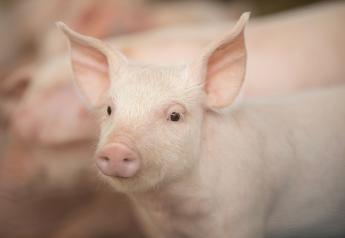We're in the Middle of a Food Crisis

The following commentary does not necessarily reflect the views of AgWeb or Farm Journal. The opinions expressed below are the author's own.
“Ewwww! I don’t like touching raw meat.”
“The grocery store is overwhelming to me.”
“It’s so much easier to pick up fast food than fix something when I get home.”
Have you heard someone you know say any of the above comments? Chances are you have, or you’ve said one or more of them yourself. The growing distance between food production and the consuming public is creating an abyss in knowledge and understanding of where food comes from, or what to do with it after it after it’s purchased.
“A lot of students have no experience in the kitchen,” says Regina Birch, a family and consumer sciences teacher in Alton, Ill. “I teach a freshmen orientation class that tells them how to read a recipe. I have students who’ve never turned on a stove before – they only know how to use a microwave. There’s a real disconnect.”
It’s hard to imagine growing up not knowing how to cook, but when you think about nuclear families with both parents working, and so many more extra-curricular activities that take away from the idea of “family meals,” it’s more understandable.
And unfortunately, basic food and nutrition knowledge is no longer taught in many schools.
“Family and consumer sciences is not a required class,” Birch says. “Several schools have eliminated it altogether because of funding.”
The high school at Alton has about 2,000 students. Her daughter attended a school with about 500 students in the high school, and the consumer science curriculum was discontinued there.
Homemade versus Ready-Made
There used to be no comparison between a home-cooked meal and a fast-food meal, but young people live in a “now” world.
“My students like ready-made, instant food, fast food,” Birch says. “They don’t see the need to make mac and cheese from scratch – they think using a blue box is making it from scratch.”
She says the young people she has in class don’t believe that homemade is better tasting. They understand what it is but they still choose to go with convenience.
“Can’t Touch This”
Not only do they not know how to fix meals, they don’t even want to touch raw food, according to Birch.
“They absolutely don’t want to touch meat,” she says. “If we make chicken nuggets – a healthy version – they’re like, OMG, they didn’t realize chicken nuggets came from a chicken breast! Handling meat is a major shock for them.”
Nor do they know the first thing about how to prepare a meal. Birch says they’ll fix one food item at a time – one would think in the world of multi-tasking that this would be an easy task, but evidently it isn’t, even when younger generations have grown up seeing food prepared.
“When my daughter got married, even she struggled with putting ingredients together in a meal. Now she has a phone app that gives her a grocery list and how to prepare it,” Birch says.
Brace Yourself
Many young people coming out of America’s high schools don’t know a head of lettuce can be chopped up, or how to use a vegetable peeler.
“We make a big to-do about using the grater – we make them grate their own cheese, carrots, etc. And I’ve had to show many students how to use a vegetable peeler. They’ve never done these things at home.”
Birch combats the situation by trying to expose students to variety. In once course she teaches family and consumer science communications, with a section on peer education.
“I have the students teach other students,” she says. “When they do this, it becomes real to them. It’s been great to see how they modify some of the lessons I’ve taught and then they teach it to other kids.”
She also spends time talking to kids about nutrition. They understand the importance of fitness, so by emphasizing nutrition, she can help students put the pieces together in terms of calories, protein and energy.
Time to Bring it Back
“Opportunities to develop cooking skills by adolescents may result in long-term benefits for nutritional well-being,” says Jennifer Utter, with the University of Auckland in New Zealand. “Families, health and nutrition professionals, educators, community agencies, and funders can continue to invest in home economics and cooking education knowing that the benefits may not be fully realized until young adults develop more autonomy and live independently.”
She is the lead author of a new study published in the Journal of Nutrition Education and Behavior, which found that developing cooking skills as a young adult may have long-term benefits for health and nutrition.
“The impact of developing cooking skills early in life may not be apparent until later in adulthood when individuals have more opportunity and responsibility for meal preparation,” Utter says. “The strength of this study is the large, population-based sample size followed over a period of 10 years to explore the impact of perceived cooking skills on later nutritional well-being.”
Agricultural leaders, farm groups, and farmers in every community should put more emphasis on food education in K-12 schools. You need know what – if anything – is being taught to young people. Work with your local, state, and national commodity organization to find out what’s available for curriculum development. Do your part to help students develop good food preparation and eating habits that will serve them well – literally and figuratively – throughout their lives.







